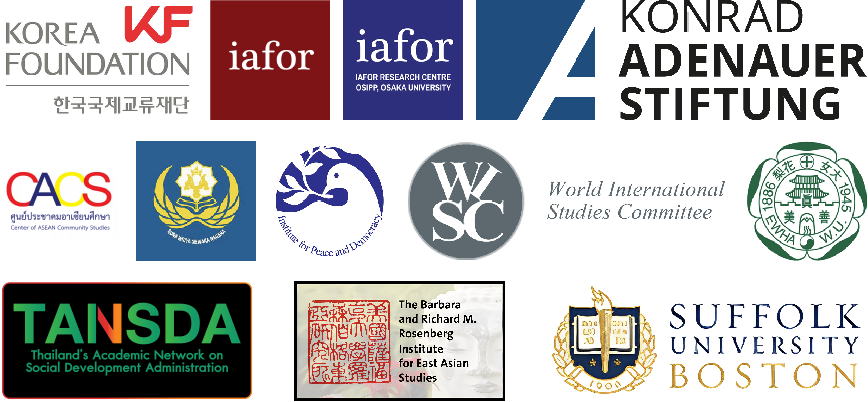

APISA2023 | APISA 17th Annual Congress
Towards New Modalities of Governance in Asia: E-democracy, Civil Society, and Human-Centred Policymaking
Key Information
Onsite Presentations: Friday, June 30 to Saturday, July 1, 2023
Venue: Merdeka Tower Business Center (MTBC), Warmadewa College, Bali, Indonesia
Online Presentations: Thursday, June 29, 2023
Registration: Pre-registration is required.
APISA 2023 is co-hosted by the Institute of Peace and Democracy and Warmadewa University in Bali, in collaboration with the Center of ASEAN Community Studies (CACS) in the Faculty of Social Sciences at Naresuan University, the IAFOR Research Centre at the Osaka School of International Public Policy’s (OSIPP) "Peace and Human Security in Asia: Toward a Meaningful Japan-Korea Partnership", and the Institute for International and Area Studies, Ewha Womans University.
We are grateful for the support provided by the Konrad Adenauer Stiftung Political Dialogue Asia, the Korea Foundation, and the Ewha Frontier 10-10 Program.
Call for Submissions
In 2005, US President George W. Bush declared that it was America’s mission to spread democracy to the world. Less than two decades since, the loss of faith in “democracy” as an ideal system of governance, development, and promotion of human rights is now, instead, widespread. As John Dunn argued in 2017, “Democracy by now provokes and expresses wider and more acute conflict than any other in the history of human speech;” it is an essentially contested idea and “not a valid title to the political compliance or allegiance of anyone.” There has been considerable regional pushback against Western liberal universalist claims and prescriptions for governing relations within and between polities. The growing antipathy toward liberal internationalism in promoting global agendas has been compounded by an authoritarian China’s lure for an alternative path to development and prosperity. In an increasingly polarizsing geopolitical landscape, many in Asia are trying to protect basic human security freedoms (freedom from fear, freedom from want, and freedom to live in dignity) from tyranny, but less enthusiasm to partake in the West’s "fight for democracy" narrative for the war in Ukraine.
Similarly, Information and Communication Technology (ICT) has previously been heralded as the harbinger of e-democracy worldwide. In recent years, however, the internet and social media have become toxic spaces for spreading fake news, disinformation, and trolling fuelled by hyper-partisan and polarizing political biases. It is imperative to revisit the original intent of e-democracy to restore the potential of digital spaces for fostering a truly inclusive, deliberative, and participatory democracy in the region.
Regardless of conceptual disagreements or unhelpful binaries, at the very least, it is time to acknowledge that the current structure of the international political economy and governance cannot be sustained without some reckoning of past failures and rethinking of what can deliver better governance, both at the nation-state and international levels. The traditional state-centric approach to security that prioritizses the survival of the state does not sufficiently address the contemporary and complex threats to human survival.
Asia is now in the throes of a Westphalian type of inter-state rivalry and arms race, while also combatting vital issues with socio-political implications, such as poverty alleviation, accessibility to education, climate crisis, and internal ethnic and religious conflicts. This dual challenge has put pressure on some governments in Asia to privilege policies of state survival at the expense of good governance and civic freedoms for their people to effectively address human security challenges. There is an urgent need for human-centric policymaking and conceptualization of security and new modalities of governance that reflect and can deliver them.
To celebrate the 20th anniversary of the Asian Political and International Studies Association (APISA), the association calls for papers that would contribute to active and innovative discussions and debates on the future of good governance. APISA welcomes paper submissions on any aspect of domestic or international governance in Asia. These can include, but are not necessarily limited to:
- Challenges to digital politics and E-Democracy in Asia
- Cybersecurity
- Civil society and the promotion of the common good
- Regional international organization (multilateralism, minilateralism, and/or Indo-pacific policymaking)
- Competing epistemological perspectives on democracy and governance
- Distributive justice and good governance
- Comprehensive peacebuilding (within and/or between polities)
- The protection and promotion of human security and human-centered governance
About the Conference
APISA is Asia’s leading academic organization dealing with political and international studies broadly defined, with research programs focused on conflict and peace studies, democracy and governance, human security, development cooperation, civilian control and security sector reform, and higher education in Asia.
The conference is open to scholars and students of international studies, as well as practitioners in the field. Selected submissions may be considered for publication in book projects based on the theme of the conference, as well as the Asian International Studies Review, a Scopus-listed journal endorsed by both academic associations, and published by Brill in association with the IIAS.
Registration



The conference is open to scholars and students of international studies, as well as practitioners in the field. Thanks to generous support from Naresuan University (Thailand) and the Konrad-Adenauer-Stiftung (KAS), the registration fees for participants will be set as shown below.
Full Conference Registration
- Covers both online and onsite sessions
- includes membership of APISA for one year
- $200 USD for presenters from developed countries
- $100 USD for presenters from developing countries
- $50 USD for graduate student presenters or audience members
Online Conference Registration
- Covers June 29 Online sessions
- includes membership of APISA for one year
- $100 USD for presenters from developed countries
- $75 USD for presenters from developing countries
- $40 USD for graduate student presenters or audience members
Registration closes on Wednesday, May 24, 2023.
Pre-registration is required.
